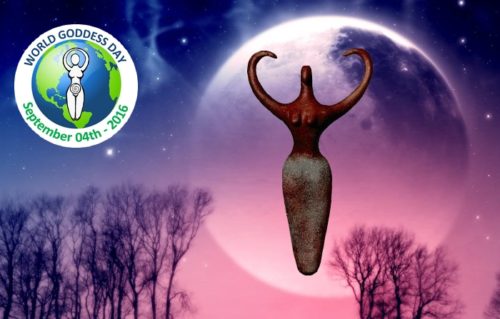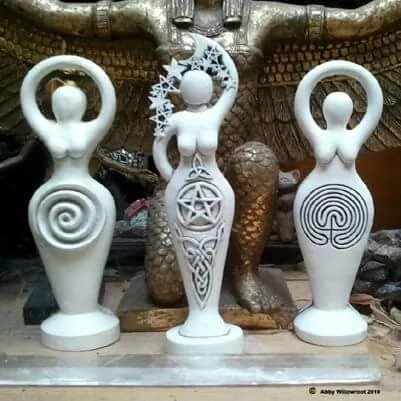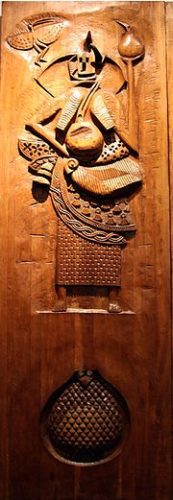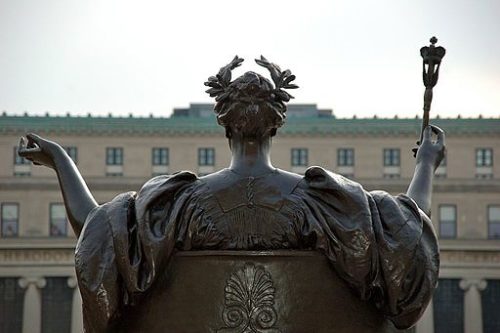TWH —World Goddess Day, the event started by Brazilian author Claudiney Prieto in 2014, will fall on Sept. 3 this year. “The goal of the World Goddess Day project is to grant to the Goddess one day of visibility to share her many myths, stories and worshiping diversity, so everyone will remember or will realize that the first religion of humanity was the worship of the Goddess,” according to the web site.
Some of the goddess-focused events already planned for this day can be found on Facebook, and those interested are invited to volunteer as local coordinators.

The inclusion of the sacred feminine in Pagan religions is why many women were drawn to them in the first place. After being taught that divinity is solely masculine, the alternative is often affirming. It is no coincidence that feminism and goddess veneration sometimes go hand in hand.
To that end, we asked some female Pagans to answer the following question:
There are many political efforts that have been made in recent years that, if successful, would limit the rights of women, such as through their access to abortions and reproductive care generally. How does this climate inform your views on goddess worship?
These are their voices.
“During this time, I believe we cannot afford to be passive,” said Ashley Nicole Hunter. “These are days for the Morrigan’s battle-savvy, for the wisdom of Athena, and for the ferocity of Kali. I honor and respect my ancestresses who called upon softer goddesses to look over their homes, but these days I look to goddesses of battle and pray for their strength and resilience to do the things that must be done.”
Star Bustamonte said, “I think the current climate of repressive and oppressive policy that impacts women’s rights has in many ways elevated goddess veneration. In times of trouble, it is natural that people look to alternatives, especially when all of the traditional options (legislative, the courts, etc.) have been exhausted.”
“Asking for a goddess to intervene in situations that impact women in critical and catastrophic way is a pretty simple choice,” continued Bustamonte. “Many of my contemporaries have mentioned over the course of past months interactions with goddesses like the Morrigan and responding to what they would characterize as her call. I have felt her presence, but do not yet feel that is the path I personally wish to travel.”
“Overall, who better to understand and assist with women’s issues, if not goddesses? The more women’s rights and health choices are in focus, I believe more and more women will be finding their way to some form of goddess veneration.”

Spiral goddesses by Abby Willowroot [courtesy photo].
“I gave up a child for adoption when there was no other choice; I could not get a legal and safe abortion.” O’Brien said. “I remember the pain and suffering of having no reproductive choice. Over the last election cycle I saw many young people, two generations behind me, who have known nothing but free choice. There was no birth-control pill when I was growing up, and I worry that people today take that for granted. Sometimes you need an irritant to act, sand in your shoe.”
O’ Brien added, “In the 1970s, covens were all, or mostly, women. Goddesses are the focus of many traditions. I have had many experiences of the Goddess, but as with any mystical experience, these must be cultivated. We know much more about goddess traditions than we did then; the ‘burning times’ were not as we believed but that knowledge has only come from goddess veneration.”
“Whether you view the creative birthing force of all life as imminent or transcendent, in spite of long, and repeated attempts to erase her, and women in general, the goddess is still alive and active in the world today,” said Rev. Angie Buchanan.
“Imagining the divine as intimate partners helps to balance consciousness of the sacred and heal the distortions of the current, rigid patriarchal systems in both our religions and our governments. A word of caution to those who support and push for the continuation of our current patriarchal paradigm: woe to the shepherd who cares only for his rams. Soon he will have no flock.”
Bernadette Montana said, “We would need to strengthen that relationship. She needs us to stand up for our rights in order to honor the divine feminine that is in each one of us. I feel that this political climate is teaching us to stand up and be seen. Makes a person wonder why this is all happening now.”
Victoria Greenia struggles with how to worship in the context of gender imbalance. “I was taught that in the ’70s, women began to reclaim their power and were now, more or less, equal. Closer inspection indicates otherwise. Women’s pay is still generally unequal, women have to work harder for promotions than their male counterparts, and women’s bodies are always political.”
“This continuing inequality makes it hard for me as a Pagan woman to want to include the divine masculine in my rituals, despite a belief that it is needed for balance,” said Greenia. “Instead of being able to fully enjoy the concept of the Horned One, I question the application of his magic: Is this just some excuse for some Pagan men to feel comfortable with their aggressive behaviors of virility compared to their female counterparts who are expected to be like Mother Earth and without complaint be ploughed and seeded?”
“. . . . Are we vessels of incredible power or are we breeding stock? Are we to be subdued or protected (and then this brings up the question, protected from whom)? How exactly does the sacred masculine work with the sacred feminine? This is what I wrestle with.”

The goddess Isis [Photo by Anna Carotti.]
Chapin-Bishop said, “Women’s rights matter because women matter. All life is sacred, and absolutely I believe that the act of giving birth — or choosing not to give birth — is holy. Being pregnant taught me that in a visceral way, and I think that approaching menopause is teaching me something new about the sacredness of being female, so I would say that I listen to my body, and I let my body teach me about the nature of the goddesses I worship.”
“But I would be every bit as passionate a defender of women’s rights if I were an atheist. I guess I’m political, and I’m religious, but in the case of feminism, my religion is rooted in the body, but not the body politic.”
“Ancient Egyptian women stand out among historic civilizations as enjoying a status of gender equality rarely seen, even today,” according to Holli Emore.
“At least three women that we know of served as pharaohs, and there are records of women physicians. These role models of female strength would no doubt be aghast to witness the deliberate ignoring, limiting, and even blocking of health care support for American women. As unsophisticated as it may have been by our standards, women in ancient Egypt had access to contraceptive measures. To our knowledge, no elite male rulers dictated what they could use and what they could not.”
Marti Fiske said, “I came to Paganism primarily because I am a feminist. . . . I could not choose Christianity and Judaism because both have modern sects which relegate woman to what I view as a demeaning role of simply bearers of future progeny with little to no individual rights. My interest in Buddhism has been longer lasting. Woman are generally treated more equally, but some sects believe that woman can only reach enlightenment if they were born as men in previous lives. Paganism was the fit for me. Women are viewed as equal partners in its expressed values, in the pantheon, and have primary roles of leadership.”
“When I look at what is happening currently in the U.S. sociopolitical climate I see a reaction to fear. . . . When people are fearful they often need to find the ‘bad person’ who they think is causing the problem. . . . Any group can be the target. . . .,” Fiske continued.

Iyami Osoronga [Candomble Museum Brasil]
“To be blunt, the men who support these anti-women laws are cowards. They fear that the changes will negatively affect them. They are afraid that women are at least as able as themselves. They don’t like a level playing ground so they want the rules in their own favor. They want to be guaranteed the winners.”
“As a woman of color,” said DonnCherie, “this is a small part of a larger, more oppressive problem, and this issue has to take a back seat to my real fears involving equality for people of color.”
“As far back as I can remember,” said Rev. Byron Ballard, “the divines have always been plural and female, so it’s hardly surprising that decades later I’m one of the founders of a goddess temple, where I also serve as senior clergy. To see the face of the divine as a female one is an idea that has been steadily growing for several decades. In a world where women continue to be marginalized, devalued and, frankly, destroyed, to proclaim the good news of goddess veneration is to perform a fairly radical act.”
“In the U.S., where women still fight for equal rights under the law — including full physical autonomy and equal pay for equal work — there continues to be a backlash against minority religions,” continued Ballard. “And in the modern Pagan community, goddess temples sometimes face the wrath of co-religionists who insist that goddesses can only be honored when in tandem with some god or other. The backlash is persistent and ongoing. Fortunately, we are strong and determined, and most goddesses, like women, have waited long enough. Too long.”
According to Carol Maltby, “Our current political situation is toxic regarding women’s reproductive rights. As a sexually active woman, a polytheistic view gives me more options for placing reproductive rights in the goddess context that will resonate best.”
“As someone who deliberately and assiduously planned the two pregnancies that brought my daughters, the big-bellied goddess statues of our distant [ancestors] that celebrated the woman who has given birth give me a feeling of respect for the sacred act of birthing that our own culture does not always supply,” said Maltby.
“As someone who had two accidental and unwanted pregnancies with subsequent abortions, I think more of the powers of Kali to make endings, or those of the Morrigan to defend the sovereignty of a woman’s body and a woman’s choices. I consider the responsibility to end an unwanted pregnancy as important a sacred choice as choosing to be pregnant.
” ‘All acts of love and pleasure are her rituals’ is a reminder that our sexuality is sacred sexuality, and not just a hormonal imperative.”
“In some ways, I’m encouraged by it,” said Courtney Weber. “Seeing a female reflection in the divine does empower feminine persons to challenge oppressive paradigms. However, it’s not a given. Even within the Pagan community, I’ve been told I should not use profanity, dress ‘immodestly,’ or behave ‘in a vulgar manner’ because I should ‘better respect my goddess self.’ Sometimes, goddess reverence becomes its own kind of suppression of women. Goddess worship does not automatically translate to support of women’s autonomy, a point that bears remembering.”
“It is scary being a woman in a man’s world,” said Kathryn Cranford, “even moreso recently than ever, but, it has only been a relatively short time, a window really, in which women have made the progress around control around their own fertility, ownership of our own bodies, options as to what to spend our lives doing, being allowed to participate in politics and leadership. . . .”
Cranford continued, “I tend to take more women being representatives as a sign that the tide is turning, not back to a time of matriarchy (as much as this country and this world could use a good thousand years under such a regime) but at least in the direction of shared perspective. Moving back to a time when there were fierce and nourishing male and female gods, it seems that the Norse and Greeks had something there. . . .
“As a midwife, I speak to the power of woman-spirit on a regular basis. Calling to that power of the birthing room out of which men have been locked for decades. ‘Here’s a cigar, you just missed the Kali moment of your wife’s life.’ One of the best things about home birth is watching fathers get to watch their partners do birth. One dad said, ‘Now I know why men have to climb mountains.’ . . . . There is power in the feminine that has been forgotten, and She needs to be woken from her slumber. . . . How many virgins in the belly of Pele’s volcano are preparing to explode in their collectively sacrificed anger? Pander to Aphrodite for long enough and you will awaken her sisters, and they are not tending those home fires in order to bake you a muffin.”
For more information on World Goddess Day, visit worldgoddessday.com. For more information on the power of women, listen to their voices.

Goddess Columbia [By Sean Shapiro / Wikimedia]
The Wild Hunt is not responsible for links to external content.
To join a conversation on this post:
Visit our The Wild Hunt subreddit! Point your favorite browser to https://www.reddit.com/r/The_Wild_Hunt_News/, then click “JOIN”. Make sure to click the bell, too, to be notified of new articles posted to our subreddit.